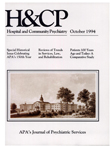Law and Psychiatry in America Over the Past 150 Years
Abstract
American forensic psychiatry was founded in 1838 with the publication of Isaac Ray's Treatise on the Medical Jurisprudence of Insanity. Ray's ideas were influential in the early history of forensic psychiatry but were overlooked in the formulation of the M'Naghten Rules in England, an early parliamentary effort to define criteria for the insanity defense. in the mid-1800s, asylumbased psychiatrists formulated model laws addressing involuntary commitment and debated the definition of mental illness for legal purposes. in the late 1800s, courts became interested in findings of brain pathology in insanity defense cases, and neurologists joined psychiatrists as expert witnesses. Beginning around 1950, increased judicial activism led to new standards for insanity in criminal cases, advances in the civil rights of mentally ill persons, and refinements in the role of expert witnesses. in 1969 forensic psychiatrists established a professional organization, and board certification in the subspecialty began in 1979.
Access content
To read the fulltext, please use one of the options below to sign in or purchase access.- Personal login
- Institutional Login
- Sign in via OpenAthens
- Register for access
-
Please login/register if you wish to pair your device and check access availability.
Not a subscriber?
PsychiatryOnline subscription options offer access to the DSM-5 library, books, journals, CME, and patient resources. This all-in-one virtual library provides psychiatrists and mental health professionals with key resources for diagnosis, treatment, research, and professional development.
Need more help? PsychiatryOnline Customer Service may be reached by emailing [email protected] or by calling 800-368-5777 (in the U.S.) or 703-907-7322 (outside the U.S.).



